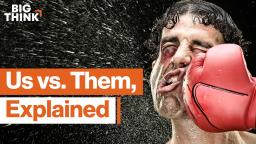community
He’s studied apes for 50 years – here’s what most people get wrong.
▸
6 min
—
with
Humans may have evolved to be tribalistic. Is that a bad thing?
▸
17 min
—
with
Many people believe that in the face of profound evil, they would have the courage to speak up. It might be harder than we think.
Why are rapture ideologies exploding?
▸
7 min
—
with
Escaping the marshmallow brain trap.
▸
6 min
—
with
MIT professor Azra Akšamija creates works of cultural resilience in the face of social conflict.
Did America’s collective mental health get worse (and then better) after the first COVID-19 lockdown?
New research identifies 16 different COVID-19 personality types and the lessons we can learn from this global pandemic.
Most people believe you can win an argument with facts – but when “facts” are so often subject to doubt, are personal experiences trusted more?
Northwell Health is using insights from website traffic to forecast COVID-19 hospitalizations two weeks in the future.
Research from MIT’s School Effectiveness & Inequality Initiative found making college more affordable cut dropout rates and boosted degree attainment.
As morally sturdy as we may feel, it turns out that humans are natural hypocrites when it comes to passing moral judgment.
▸
5 min
—
with
Gun violence is a public health crisis that is notoriously difficult to study because of politics. Finally, a new research initiative has the green light to collect life-saving data.
The rites we give to the dead help us understand what it takes to go on living.
Radical thinker Rutger Bregman paints a new, more beautiful portrait of humanity.
We make school kids read “Lord of the Flies”—but it’s only half the story.
▸
5 min
—
with
Anastasia lives alone in perfect harmony with nature – or so the story goes – and nature serves her devotedly.
The negative associations of introversion help to explain why loneliness now carries such social stigma.
Experts on the science of giving look into whether there’s another possible upside to doing good: physical attractiveness.
Even kids get that a real leader puts others’ interests first.
The results of this study showed depressive symptoms being highest in adolescence, declining in early adulthood and then climbing back up again into one’s early 30s.
MIT Professor Sinan Aral’s new book, “The Hype Machine,” explores the perils and promise of social media in a time of discord.
“Nothing but naked people: fat ones, thin ones, old, young…”
Researchers say that moral self-licensing occurs “because good deeds make people feel secure in their moral self-regard.”
What responsibility should government authorities and Big Tech take in policing the spread of sedition-oriented content?
Technology is an important tool, but it will take an ecosystem of educators, students, and caregivers to make the most of it.
▸
9 min
—
with
There are pros and cons to owning a pet as a marginalized individual.
Living simply now strikes many people as simply boring.
It can mean citizens drinking contaminated groundwater or being schooled in decaying buildings with asbestos problems.
Teaching community organizers via WhatsApp yields encouraging results in South Africa, according to MIT Governance Lab research.





























